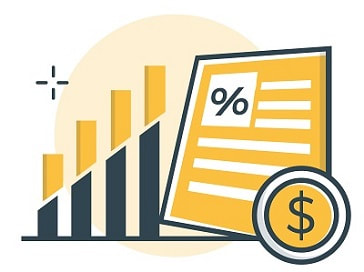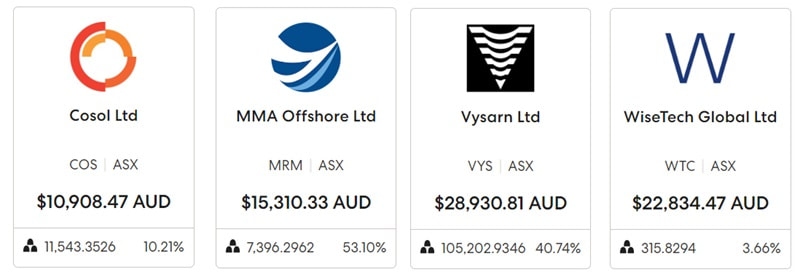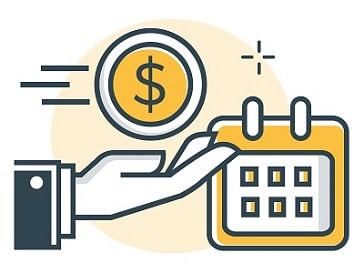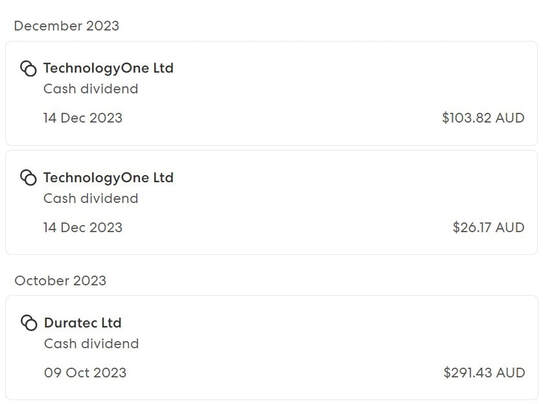How to Invest in Australian Shares and the ASX from New Zealand
Platforms like Superhero, Sharesies, Tiger Brokers, Jarden Direct, ASB Securities and Interactive Brokers make buying Australian shares effortlessly accessible - our guide explains everything you need to do before you sign up, as well as a range of investing platform alternatives that invest directly into ASX-listed shares.
Updated 24 April 2024
Summary
This guide is designed to provide comprehensive insights into investing in Australian shares. We outline and explain:
Summary
- The Australian sharemarket (ASX), boasting prominent companies such as Commonwealth Bank, BHP Group, Telstra, and Woolworths Group, presents many investment opportunities.
- In contrast to the more locally-focused NZX, which lists companies like Auckland Airport and Spark, the ASX offers exposure to a diverse range of industries and global markets, with 2,200+ investing opportunities (vs 200+ on the NZX).
- This makes the ASX an attractive option for New Zealand investors looking to diversify their portfolios. However, direct ASX investing remains largely unpopular among New Zealand's retail investors who prefer NZX and US-listed funds, index trackers and shares.
- Thanks to the rise of online investment platforms, accessing the ASX has become cheaper and easier for New Zealand-based retail investors. There are also beneficial tax changes outlined below.
This guide is designed to provide comprehensive insights into investing in Australian shares. We outline and explain:
- Investing in Australia - All the Options Compared - An overview of the various platforms available to New Zealand investors for buying and selling Australian shares, comparing their features, fees, and services.
- Direct ASX Share Investments and FIF (Foreign Investment Fund) Tax Considerations on Dividends and Capital Gains - Outines how the IRD's tool helps you check if your ASX-listed investments are exempt from FIF rules, impacting how dividends and capital gains are taxed.
- 5 Must-Know Facts about Investing in the Australian Sharemarket - Essential information every investor should be aware of before investing in the ASX directly or via funds.
- Benefits and the Bottom Line – What to Watch Out For When Investing in Australian Shares from New Zealand - Covers the advantages of investing in Australian shares and important considerations, including tax implications and currency exchange factors.
- Receiving Dividends from ASX Shares - Explains the methods and implications of dividend payments from ASX-listed shares for New Zealand investors, highlighting the differences between online platforms like Sharesies and direct brokerage options.
- Investing in Australia – Frequently Asked Questions - Answers to common queries that investors might have about the process, regulations, and best practices for investing in Australian shares from New Zealand.
Investing in Australia - All the Options Compared
There are many ways you can invest in Australian shares - Superhero, Sharesies, Tiger Brokers, Jarden Direct, ASB Securities and Interactive Brokers are platforms that let you buy and sell ASX-listed shares online or via a call.
Other options available in New Zealand include investing platforms which offer ASX-focused managed funds and ETFs tracking ASX-listed shares. None of the platforms charge monthly fees, so you're free to join more than one while keeping your ongoing costs down.
Other options available in New Zealand include investing platforms which offer ASX-focused managed funds and ETFs tracking ASX-listed shares. None of the platforms charge monthly fees, so you're free to join more than one while keeping your ongoing costs down.
Share investing platforms offering ASX-listed shares:
Other options offering Australian investments:
- The ASX has 2,200+ shares and ETFs, which can be bought and sold using Superhero, Sharesies, Tiger Brokers, Jarden Direct, ASB Securities and Interactive Brokers. Our reviews explain more about each option, the costs, pros and cons, and must-know facts.
Other options offering Australian investments:
- Smartshares – offers several Australian-focused ETFs; our Smartshares review outlines more.
- InvestNow – offers Smartshares' Australian ETFs and managed funds; our InvestNow review outlines more.
- Flint Wealth - Offers a selection of actively managed ASX-focused funds; our Flint Wealth review outlines more.
- Fund managers – examples include Milford Asset Management, Fisher Funds and Pie Funds, which have a selection of managed funds focused on Australian markets, alongside wholesale investing options such as Discovery Funds Management Limited's Founders Fund.
Australian Shares - Superhero vs Sharesies vs Tiger Brokers vs Jarden Direct vs ASB Securities vs Interactive Brokers
- Our table below reflects the differences between trading platforms when buying $1,500 of shares (for example, around 300 Qantas shares, or around 15 Xero shares).
- All fees and costs are in AUD.
- Some platforms call their brokerage fee a 'transaction' fee or similar, but for the purposes of our comparison, we have kept the column's title consistent.
- We've placed Superhero third in our rankings, following Interactive Brokers and Tiger Brokers. This decision is primarily due to the fee structure of Superhero, where customers incur a charge of NZ$0.50 for every AU$100 converted from AUD back to NZD. This effectively counteracts the 0.50% fee (AU$0.50 for every NZ$100) applied when converting NZD to AUD for the purchase of Australian shares or ETFs. Although Superhero’s rates may seem more competitive than those of Tiger Brokers, we have conservatively ranked them third due to their FX fee approach.
- Please note that Interactive Brokers does not operate as a registered company in New Zealand. As of November 2023, it now appears on the Financial Service Providers Register, but there is no local team, office or regulatory oversight. We have included it here for comparison purposes, but please be aware it operates differently to the other investing platforms listed below.
Investment Platform |
Brokerage fee |
FX fee NZD:AUD |
Pass-through fees / Agency fee |
Total Fee Cost on $1,500 Share Purchase |
$0.025% X trade value (minimum $5 per order) |
0.35% |
0.03% X Trade Value |
$10.70, comprised of: $5 (Brokerage) $5.25 (FX) $0.45 (Pass-Through) |
|
$2 |
0.50% |
nil |
$9.50 |
|
1.9% up to a cap of $15 |
0.50% |
nil |
$22.50 |
|
$29.00 (trade value up to $30,000) |
Up to 1.50% (the current margin applied is 0.89% as at 5 May 2023 per their guidance) |
nil |
$42.35 |
|
$15 (up to and including $1,000) $30 ($1,000 to $10,000) 0.30% (over $10,000) |
Not disclosed (ASB Securities customers can maintain a foreign currency account [FCA] which reduces exposure to FX margins) |
Nil |
$30 |
|
0.08% of Trade Value (Minimum $6 per order) |
0.002% with a USD 2 minimum (around AU$3) |
Minimal (less than 1 cent) |
Around $9 |
Direct ASX Share Investments and FIF Tax Considerations on Dividends and Capital Gains
What you need to know:
In order to use the IRD's tool you will need:
Understanding the results:
Our Tax on Investments guide has more information.
- The IRD has a tool which you can use if you plan to buy (or already have) a shareholding in an Australian company, listed on the ASX, to check if it is exempt from the foreign investment fund (FIF) rules.
- If it is, then the FIF rules will not apply to the shareholding, and it will be taxed under the same rules as apply to New Zealand shares. For an individual, this means that dividends will be taxed on a cash basis and capital gains will be taxable if the shares are held on "revenue account".
- For everyday personal long-term investors, this means there won't be any capital gains tax on share sales unless you are classed by the IRD as a "trader" and buy/sell with the intent of immediate profit, but the IRD will assess 'trading' on a case by case basis.
In order to use the IRD's tool you will need:
- The ASX ticker code for the company you’re checking
- The financial year for which you want information
- Important: Some companies have more than one ticker because they have more than one equity or debt security. Each such listed security has its own ticker. Additionally, some companies change their ticker during the year. Companies may also change their name.
- The IRD's tool is based on a standard 31 March balance date. You should not rely on the tool if you have a non-standard balance date.
Understanding the results:
- If the ASX-listed company qualifies for exemption, income from the shares is taxed under the IRD's general income tax rules, the same as investments in New Zealand. They are not attributing interests for tax purposes and therefore fall outside the FIF rules.
- If the ASX-listed company doesn't qualify for an exemption, it's classed as a FIF and income will generally be determined and taxed under the:
- Fair dividend rate (FDR) method,
- Comparative value (CV) method,
- Cost method (CM) or
- Deemed rate of return (DRR)
Our Tax on Investments guide has more information.
5 Must-Know Facts about Investing in Australian Shares from New Zealand
Before making your first investment, it's important to know how the platforms compare and what to consider before going further. The ultimate goal of each platform is to minimise investor costs and maximise returns, so being aware of the key differences will help you find a platform that's right for you.
Brokerage fees vary between platformBrokerage fees are charged whenever you buy and sell shares. You’ll pay anything from around $2 to $40+ per trade, which adds up if you make a few trades and are paying above-average to do so. In general, the lower the brokerage fee, the more profitable your investments will be.
|
You’ll pay to convert NZD to AUD (and back again to NZD) – know the margin before you investMost platforms use the foreign exchange spot rate (the market rate that banks use) and charge a fee on top as a way to make money. Sharesies charges 0.50%, in line with other online brokers. You’ll pay the same again when you convert AUD to NZD (and some platforms may automatically convert your AUD to NZD which isn’t helpful, and expensive by way of FX fees, if you want to buy more Australian shares right away).
|
User experience and depth of data are key – make sure you ‘road test’ the platforms to find out what works for youThe more data a platform offers, generally, the more informed you’ll be about a company's price history. While you can always use Google Finance or Fool.com to see the latest data, having this information available directly on your chosen platform offers a far better user experience. Simply Wall Street and Market Index also provide insights.
Sharesies, Superhero, Interactive Brokers and Tiger Brokers (NZ) are examples of powerful platforms that deliver live share price updates, graphs and the ability to search by sector etc. Another consideration is whether you prefer to use an app or a website, or both. Some platforms are website-only, so this can limit your options if you want the convenience of on-the-go access. |
Know upfront how customer support is handledIs support phone-based, e-mail only or chat-bot? And is support available during the ASX markets (around 12pm to 6pm in New Zealand) or during NZ work hours? While the customers of most platforms don’t tend to require ‘urgent’ support, it’s still a consideration to make. If you're quite particular on the support level you need, this will influence your choice of platform significantly.
|
Benefits and the Bottom Line – What to Watch Out For When Investing in Australian Shares from New Zealand
Benefits
But, be aware:
Overall, we say:
ASX Investing Examples and Must-Know Considerations:
Our view: There's a lot to like about investing in ASX-listed companies and/or Australian-focused funds. However, it's not without its risks - the NZD moves constantly against the AUD which makes funds popular given many of them are hedged. Our guide to the basics of hedging investments explains more. Given the lack of New Zealand media focus on ASX-listed companies, you'll need to research extensively before making any individual share selections.
- Enormous potential for investments – the NZX offers around 200 companies and ETFs (and arguably, many small companies listed don’t do much). Investing in the ASX markets opens up over 2,200 companies and ETFs.
- Low fees – the ASX has become cheaper to invest in given the rise of online platforms and more favourable tax rules from the IRD by way of FIF exemptions.
But, be aware:
- Exchange rates fluctuate – if the NZD becomes stronger against the AUD, your investments will be worth less in NZD, all other things being equal, in NZD. This means that if you invest NZ$10,000 and the NZD:USD moves from 0.90 to 0.95, your money is worth around NZ$475 less if you converted back into NZD at the 0.90 rate.
- Unlike the NZX50 which is open from 10am to 4:30pm New Zealand time, the ASX is open between 10am and 4pm Sydney time (either 12om or 1pm to 6pm or 7pm New Zealand time, depending on the time of year).
- It’s harder to observe local Australian market conditions in New Zealand – while there is endless data and share picking websites pumping out sharemarket noise, you don’t live in Australia and therefore are somewhat detached. This means you may miss out on growth shares who are not covered in New Zealand media. If you are an investor who likes to see what you’re investing in, Australian markets can be isolating.
- Suggested starting points include Simply Wall Street, Listcorp (for sector listings) and a subscription to the Australian Financial Review.
Overall, we say:
- There's a lot of potential upside from investing in Australian market, but never invest any more than you can afford to lose.
- Newly launched platforms are safe and have made it affordable and easy to buy and sell ASX-listed shares.
- Whatever market conditions are, there's arguably always more buying opportunities than the NZX given the low trading volumes and 10X more companies listed on the ASX.
- However, you can get exposure to Australian shares using KiwiSaver, Australasia-focused managed funds, sector funds and Australian companies listed on the NZX, like bank shares. We suspect the range of options is why investing in the ASX directly isn't widely popular with New Zealand retail investors.
ASX Investing Examples and Must-Know Considerations:
- To re-inforce the risks of ASX-investing, the example Sharesies portfolio (below) mentions small, mid and large cap companies presumably not known to most New Zealand-based investors, despite returns of around 3% to 50% over the the fourth quarter in 2023. By comparison, if a NZX-listed share had increased 50% in three months, it's arguable individual investors would soon hear about it.
- As a New Zealand-based investor, it's always easier and cheaper to buy NZ shares on the NZX rather than the ASX. The ASX aggressively targets New Zealand companies hoping to list given the fees and trading volume generated; more than 60 of New Zealand’s "top companies" are currently listed on ASX per ASX marketing. However, this doesn't mean maximum upside for investors - recent problematic ASX listings by New Zealand companies include:
- September 2021: Pacific Edge Limited - $1.48 to 10 cents
- March 2021: My Food Bag Group Limited, $1.50 to 15 cents, now de-listed from the ASX
- September 2020: Laybuy Group Holdings Limited, $1.63 to 3 cents, now de-listed from the ASX
Our view: There's a lot to like about investing in ASX-listed companies and/or Australian-focused funds. However, it's not without its risks - the NZD moves constantly against the AUD which makes funds popular given many of them are hedged. Our guide to the basics of hedging investments explains more. Given the lack of New Zealand media focus on ASX-listed companies, you'll need to research extensively before making any individual share selections.
Receiving Dividends from ASX Shares
Your dividend management options vary when you invest in ASX-listed shares through platforms like Sharesies and Superhero:
Our view: Each option has its own set of implications, such as currency exchange rates for NZ bank account deposits and investment strategies for DRPs. It's important to align your dividend payment method with your overall investment strategy and financial goals. Remember, dividend policies and options can vary from company to company, so reviewing the specific options available for each investment is crucial.
- Dividends via Sharesies (and most other online brokers): Using Sharesies (or similar) for ASX investments simplifies dividend payments; dividends are directly credited as cash to your Sharesies wallet, an example of what this looks like is shown below. However, Sharesies and most other online investing platforms don't offer the option to enrol in Dividend Reinvestment Plans (DRPs), which means you'll receive all dividends in cash rather than reinvesting them in additional shares. This means you'll pay brokerage fees to invest AUD in more shares and/or FX fees to convert it back to NZD.
- Direct Ownership and Share Registries: Other investing platforms and brokers offer more useful options:
- Dividend Reinvestment Plans (DRPs): Some companies offer DRPs, allowing you to automatically reinvest your dividends in additional shares of the company, fostering compound growth of your investment.
- NZ Bank Account Deposits: Many Australian companies offer the convenience of depositing dividends directly into your New Zealand bank account in NZD. However, the fees and poor value FX rates can erode these earnings. We suggest considering services such as Wise or Revolut to ensure more of the dividend is kept by you and not a bank.
- Australian Bank Account Payouts: Alternatively, dividends can be paid into an Australian account, including Wise and Revolut accounts. This can be beneficial if you wish to keep your dividends in AUD or have other financial needs in Australia.
Our view: Each option has its own set of implications, such as currency exchange rates for NZ bank account deposits and investment strategies for DRPs. It's important to align your dividend payment method with your overall investment strategy and financial goals. Remember, dividend policies and options can vary from company to company, so reviewing the specific options available for each investment is crucial.
Investing in Australia – Frequently Asked Questions
Investing in Australia needs some thought when it comes to foreign exchange rates, tax, investment management and more. Our FAQs below explain what you need to know.
What happens to my investment if the NZD:AUD exchange rate moves?
If you buy shares on the ASX, there are no hedging options. This means that there’s no arrangement to mitigate any move in the exchange rate. So, if the NZD goes up against the AUD, and all other things being equal, the NZD value of an investment will be less due to the AUD being worth less. But you won’t see that in real terms unless you sell the investment and convert the AUD back into NZD.
If you would prefer Australian share investments that are hedged (and protecting you from currency movements, as outlined in our dedicated guide), Sharesies, Smartshares and InvestNow offer such funds. There is always a fund’s hedging fee added to the annual management fee, usually around 0.30% to 0.50%.
If you would prefer Australian share investments that are hedged (and protecting you from currency movements, as outlined in our dedicated guide), Sharesies, Smartshares and InvestNow offer such funds. There is always a fund’s hedging fee added to the annual management fee, usually around 0.30% to 0.50%.
Is my money safe, and who owns the shares I invest in?
Sharesies operate under the custodial model and use a custodial service to keep track of your money and investments from the moment you invest until you decide to sell. Sharesies hold your investments on bare trust, meaning they hold them on your behalf and for your benefit. You are the legal 'beneficial owner' of the investments, meaning you are entitled to the full value of your investments, including any gains. If anything were to happen to Sharesies, your investments would still be yours, held separately by Sharesies Nominee Limited.
Tiger Brokers (NZ) offers a similar structure; it's common for online brokers to use a custodial or nominee service to hold assets on behalf of their clients, ensuring the clients retain beneficial ownership of their investments.
If you use Superhero, like Tiger Brokers (NZ) and Sharesies, the shares are held in custody on your behalf - this explainer page on the Superhero website explains more.
If you use ASB Securities to buy Australian shares, your shares will be held by Finclear Execution Ltd in your name and registered to your Holder Identification Number (HIN). This is known as a CHESS-sponsored holding. You'll have a HIN for each broker if you have share trading accounts with different Australian brokers. ASB Securities explains its process here.
Our guide to custodians explains more.
Tiger Brokers (NZ) offers a similar structure; it's common for online brokers to use a custodial or nominee service to hold assets on behalf of their clients, ensuring the clients retain beneficial ownership of their investments.
If you use Superhero, like Tiger Brokers (NZ) and Sharesies, the shares are held in custody on your behalf - this explainer page on the Superhero website explains more.
If you use ASB Securities to buy Australian shares, your shares will be held by Finclear Execution Ltd in your name and registered to your Holder Identification Number (HIN). This is known as a CHESS-sponsored holding. You'll have a HIN for each broker if you have share trading accounts with different Australian brokers. ASB Securities explains its process here.
Our guide to custodians explains more.
Can I invest in an ASX-based ETFs and managed funds from New Zealand?
Yes – Sharesies, Tiger Brokers (NZ) and other platforms offer a number of ETFs, and many New Zealand fund managers offer investments which invest in ASX-based companies, with Smartshares offering the widest choice via their Australian shares ETFs. Non-property-focused examples include:
Beyond Smartshares, you can look at fund managers such as Milford Asset Management (who offer the Australian Absolute Growth Fund) and Pie Funds (who offer three funds), among others, who offer managed funds focused on ASX-listed companies.
- AUS TOP 20 ETF (OZY)
- AUS MID CAP ETF (MZY)
- AUS DIVIDEND ETF (ASD)
- AUS FINANCIALS ETF (ASF)
- AUS RESOURCES ETF (ASR)
- S&P/ASX 200 ETF (AUS)
Beyond Smartshares, you can look at fund managers such as Milford Asset Management (who offer the Australian Absolute Growth Fund) and Pie Funds (who offer three funds), among others, who offer managed funds focused on ASX-listed companies.
I want to invest in Australian shares using a platform, but are there alternatives to investing in shares directly?
Yes – ETFs offer the opportunity to invest in many Australian industries and make investing relatively easier and less time-consuming if you're looking for diversification; Smartshares offers the widest choice via their Australian shares ETFs.
How much of my portfolio should I invest in Australian shares?
MoneyHub isn't a financial adviser, so we can't suggest any appropriate ratio. As with any investment, diversification is the key to managing risk. Keeping your savings in cash, term investments/fixed-interest, a portfolio of shares and a handful of managed funds is a proven way to minimise your exposure to any one investment.














